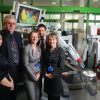
Study Into Surgical Robots Unites RD&E With University
A surgical robot pulled in huge crowds when it went on display at the Royal Devon and Exeter NHS Foundation Trust (RD&E).
Members of staff and hospital visitors had the opportunity to learn more about how the robot works and even try their hands at an operation – on tiny rubber sculptures, rather than patients.
The £2.5 million state-of-the-art robotic equipment is being used in the RD&E to carry out complex surgery for prostate cancer.
During robot-assisted surgery, the surgeon watches and guides the procedure on a high-definition computer screen with 3-D vision.
The demonstration day marked the beginning of a pioneering research programme into robotic surgery between the RD&E and the University of Exeter, as well as heralding the start of national prostate cancer awareness month. Representatives from local prostate cancer support charity, the Chestnut Appeal, attended and presented a cheque for £125,000 to the hospital. Another cheque, for £2,500, was presented by Roger Dawe, on behalf of the Norman Family Charitable Trust.
Consultant Urologists, John McGrath and Liz Waine, were there to explain the intricacies of the equipment.
Mr McGrath said: “It was fantastic that so many people wanted to find out more about robotic surgery. There was a really good atmosphere around the robot all day and people enjoyed the challenge of operating.”
He added: “Research and clinical tests have already confirmed the benefits and safety of robotic surgery for patients in certain kinds of complex surgery. These benefits include a faster recovery and reduced blood loss.
“Because of the robot’s precision and cutting edge technology such as 3-D vision and magnified views, it has been suggested that surgeons can be trained more quickly and will feel less stress during difficult procedures.”
Mr McGrath and the research team have won a highly prestigious grant from Intuitive Surgical in California, manufacturers of the da Vinci surgical robot. The company have agreed to fully fund provision of a second robot at the RD&E for nine months to exclusively run studies looking at differences in the mental workload, stress and learning curves of novice and expert surgeons.
The findings will help inform the wider NHS about the potential benefits of robotic surgery in training the next generation of surgeons safely, within a timely fashion and with technology that may help them deal more effectively with stressful aspects of surgical procedures.

















